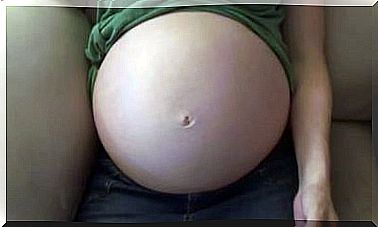The 6 Most Frequent Pregnancy Complications

Do you know what are the most frequent complications in pregnancy? Next, we’ll delve a little deeper into these cases.
While pregnancy complications are generally mild, some can be severe and we should pay special attention to them.
It is essential to know what symptoms can be considered serious during pregnancy in order to avoid affecting the baby’s health or, in the worst case, that a loss could occur.
When these symptoms appear, the doctor will be responsible for carrying out the necessary tests. If you notice any anomaly, the necessary actions must be taken.
To avoid any harm to the baby, we present some of the most frequent complications in pregnancy.
The 6 most frequent complications in pregnancy
1. Little amniotic fluid or oligohydramnios
The amniotic sac is responsible for protecting and helping the baby to develop properly during pregnancy.
An insufficient amount of amniotic fluid can become a complication of pregnancy.
So, the doctor who monitors the pregnancy is responsible for detecting whether this anomaly manifests itself at some point in the pregnancy process. If it detects it late in pregnancy, it will likely induce labor.
2. Placenta previa
Having placenta previa means that it is not well positioned, meaning that it is too low in the uterus.
In early pregnancy it is usually not a major inconvenience. But if the position persists until the end of the gestation process, the mother may bleed or give birth prematurely.

3. Gestational diabetes
If you have diabetes during pregnancy, your sugar levels will be checked throughout the pregnancy process.
Diet and exercise changes must be made so that the mother remains healthy and with stable sugar levels.
If gestational diabetes is not properly controlled, it can have serious consequences for the baby’s health.
4. Premature delivery
In general, preterm births are not of great concern and tend to occur frequently. However, it can sometimes become one of the most frequent complications in pregnancy.
If you start having contractions before reaching the 37th week of pregnancy, the birth may be before the ideal time for the baby’s health.
5. Pre-eclampsia
This condition is high blood pressure caused by pregnancy. It happens because the placenta generates substances that clog the arteries.
This causes high blood pressure, swelling that doesn’t go away, and an excessive amount of protein in the urine.
6. Reduced baby movements
Babies begin to move from week 7 or 8 of pregnancy. However, this is often not noticeable to the mother because they are still very small.
It is possible to feel the baby from the 16th week onwards, but some mothers can only feel it after the 20th week.
A sudden drop in fetal movement can be indicative of pregnancy complications. In this case, mother and child must be placed under observation immediately.

Most frequent complications that can occur in childbirth
Although births now have adequate health care, some countries are still not so prepared.
Unfortunately, not even those with the best facilities and services are exempt from the possibility of an eventuality.
This can cause the baby to have some health problems such as cerebral palsy and other illnesses.
In the worst case, there can be the possibility of death for both the baby and the mother.
For more precise information, we present some of the most frequent complications that can occur during childbirth:
- Contractions during dilation are often not effective. Thus, the uterus loses strength and this causes the birth to become stagnant.
- Premature birth: if the baby is born before 37 weeks, it can be considered a premature birth. This type of delivery can originate from uterine anomalies, malnutrition, maternal illnesses, infections and other unknown causes.
- Position of the fetus: supervision by the responsible physician is essential to determine the positions in which the baby and umbilical cord are.
- Fetal distress: can happen due to a decrease or interruption of oxygen flow due to complications in childbirth.
It is essential that the mother informs her doctor if she notices any abnormality during pregnancy. Thus, it is possible to prevent the baby from having difficulties to be born or health problems.
The possible complications in pregnancy are many, but they can be treated by detecting the problem in time.









